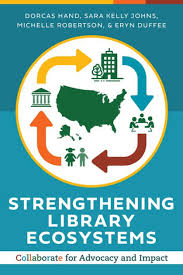2018 School Spending Survey Report
Strengthening Library Ecosystems: Collaborate for Advocacy and Impact
ALA Editions.
Jul. 2024.
272p.
pap $54.99. ISBN 9798892555722.
COPY ISBN
VERDICT A good resource that offers detailed insights and practical examples on how to strengthen advocacy and collaboration through ecosystem thinking.
RELATED
ALREADY A SUBSCRIBER? LOG IN
We are currently offering this content for free. Sign up now to activate your personal profile, where you can save articles for future viewing





Be the first reader to comment.
Comment Policy:
Comment should not be empty !!!